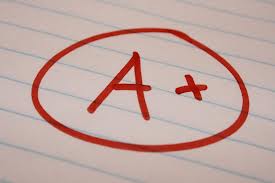Students admit to mixed feelings about how grades are handled
By Chloé Bellamio
As the second week of December comes to a close, the students of Bryn Mawr College and Haverford College seem to get busier by the minute. Holed up in the libraries or in their dorm rooms, they are hunched over heavy textbooks and squinting at their computer screens, learning various formulas and writing multiple papers.
Finals week is upon the 2,500 students of Bryn Mawr and Haverford, dragging along its fair share of stress and worry.
 It would be natural to assume that grades, and their anticipation, play a large role in this stress and worry, even though both colleges they do not emphasize grades and discourage their students against discussing them too much. This is done in the name of creating a less stressful learning environment.
It would be natural to assume that grades, and their anticipation, play a large role in this stress and worry, even though both colleges they do not emphasize grades and discourage their students against discussing them too much. This is done in the name of creating a less stressful learning environment.
To test this theory, we conducted dozens of interviews with Bryn Mawr and Haverford students and also conducted an email survey of all students with the goal of getting a clear picture on what students’ think about the present system.
We got replies to the survey from 118 Bryn Mawr students and 332 Haverford students. This sample, representing about 10% of Bryn Mawr’s enrollment and 25% of Haverford’s, offers a good notion of the students’ thoughts on grades.
Here are our major findings:
- Most Bryn Mawr and Haverford students do not think there is too much emphasis on grades and too much open competition over grades, but they think the competition is mostly internally driven.
- If most Bryn Mawr and Haverford students come from competitive high schools, their high school experience mostly did not influence their choice to attend Bryn Mawr of Haverford. When it did, it was more because their high school encouraged them to look at top-level colleges than to escape grade competition.
- While most students agree with the emphasis the colleges put on grades, for some students, the lack of insistence on grades make it more difficult to know where they stand academically compared to others.
- Students from both colleges strongly dislike the fact that the 4.0 scale does not allow for an intermediate grade between 3.3 and 3.7, and want a 3.5 inserted.
- While students have a lot of thoughts about the systems in place at Bryn Mawr and Haverford, they are not inclined to make many changes, if any.
The emphasis of both colleges on grades appears to be at the heart of the students’ perspectives on grades.
When asked to quantify the emphasis of their colleges about grades, 68% of Bryn Mawr respondents indicated it is “about right,” against 27% arguing there is too much emphasis on grades and 11% too little.
The results for Haverford indicate a slightly different view: 59% of the respondents believe grades are talked about enough, whereas 41% wish grades were more discussed.
Internal pressure
For Meredith Scheiring, a Bryn Mawr College junior, the perceived emphasis on grades depends on the individual.
“If grades are something that is important to you, you’ll see it influences more, she said.“I think there is a lot of pressure to do well, but I don’t think it equates to grades. I really don’t see people comparing numbers or letters per say… There is a level of competition and high expectation […] but I don’t see it specifically with grades.”
Bryn Mawr College senior Amy Callahan agrees that the emphasis put on grades by the college instills more of an
“internal competition” rather than setting up people to be “super-competitive with one another.” She added that it “creates a really intense energy, so [students] almost don’t need to be competing against other people”.
For Amy Zamora, a Haverford College sophomore, the emphasis does not really come “from the administration, other students, or the departments or specific academics” but from the students themselves.
“We are pretty much all students who come from very competitive backgrounds and are used to getting good [grades] I find that I put too much emphasis on my grades as a determining factor in what type of student I am, which isn’t really something that’s helpful all the time.”
Internalized competition of students against themselves seems particularly strong in Bryn Mawr and Haverford. However, like any internalized behavior, it does not appear to be bothering the students all that much.
What of the “very competitive backgrounds” Zamora was talking about?
Competition in high school
When asked if their high school was competitive when it came to grades and class rankings, 53% of Bryn Mawr respondents said that it was. Only 4% indicated coming from a high school that was not competitive at all, while 30% said coming from a high school that was no more competitive than normal and 14% from a generally non-competitive high school.
Bryn Mawr College sophomore Sarah Juma, from Abuja, Nigeria, described her high school as very competitive “because to get into my high school you, have to take an entrance exam and then an interview. They filter it down from a pool of 2,000 to 100 per class… There was a ranking per grade so you would actually have a position by grade. […] Everyone below a grade of 65% was on academic probation. People used to compare SAT scores.”
 Juma’s account of her high school is not an isolated one. Rachel Clark, a Bryn Mawr College senior from Colorado Springs, Colo., said she went to a private school “where most strove to be in the 10% of the class. There was a social pressure to be an academic overachiever. For example, it was critical yet difficult to get into our branch of National Honors Society. […] If you weren’t in it, people knew your GPA wasn’t high enough.”
Juma’s account of her high school is not an isolated one. Rachel Clark, a Bryn Mawr College senior from Colorado Springs, Colo., said she went to a private school “where most strove to be in the 10% of the class. There was a social pressure to be an academic overachiever. For example, it was critical yet difficult to get into our branch of National Honors Society. […] If you weren’t in it, people knew your GPA wasn’t high enough.”
If most Bryn Mawr and Haverford students share similar stories, they did not all feel the same about this high school competition.
Bryn Mawr College sophomore Stephanie Cao, from Vietnam, said that, while it was good to “always know where you are” performance-wise, it sometimes felt “like you are in a battle, fighting for grades”.
Haverford College senior Isabella Bertagna, from New York City, seems to agree with this. She said that “everyone knew everyone else’s grades, all the time, and everyone was super competitive and cut-throat about it.”
However, Bryn Mawr College sophomore, Devica Bhutani from Philadelphia, said that this strong competition “made [her] feel smart”.
The answers to our surveys don’t indicate that Bryn Mawr and Haverford chose to attend the colleges in reaction to their high school’s competition, since the colleges are known for being less grade-competitive.
Thirty-four percent of the Bryn Mawr respondents indicated their high school experience had been somewhat of a factor in choosing to attend Bryn Mawr, and 28% said high school experience had very much influenced their college choice. However, 10% said their high school experience had not much influenced their college choice, and 27% said it had not influenced them at all.
Little effect
For Tyler Fong, a Haverford College sophomore from San Marino, Calif., it “definitely played into [his] decision a bit, but not as much as other factors”.
Students indicated that, when their high school experience had been a factor in their choice to attend Bryn Mawr or Haverford, it had been because their high school’s competition encouraged them to apply to top schools.
Ming Lee, a Bryn Mawr College senior from New York City, said that the competitive of her high school “made [her] only look at top-tier schools… I wanted to be able to brag that I’m going to a top college.”
The heart of the true thoughts of Bryn Mawr and Haverford students about grades lies in how much emphasis on grades they deem necessary.
Many students commented on how much they cared about expressing and talking about grades.
For Isabella Dorfman, a Bryn Mawr College junior who did not know about Bryn Mawr’s policy on grades when she applied, said that “If I have known that grades, even against herself, were going to be such a big thing, I think I would have been a little less interested in Bryn Mawr College”, where she thinks grades are too important for the individual. She went on to say that, for her, “grades don’t reflect intellect or hard work”
Dorfman, however, does not express the most popular opinion.
For 14% of Haverford students who answered our survey, grades play no role in their learning process, while 46% say they play a positive role in their learning process and 41% talk about a negative role. Bryn Mawr respondents indicated that grades played no role in their learning process for 13% of them, while 46% of them indicated a positive role and 41% a negative role.
Several students expressed how the distant relationship of Bryn Mawr and Haverford to grades made it much more difficult for them to know where they were standing, from an academic point of view, compared to the rest of their class.
Where do I stand?
As a Haverford student said in the comments section of the survey, “I like Haverford’s social inclination to not talk about grades with other students, but I’ve noticed that this can be a HUGE source of stress because TEACHERS OFTEN DO NOT POST AVERAGES for their assignments, leading one to constantly question how well they are actually doing in a course.”
A similar comment was left on the survey sent out to Bryn Mawr students: “I wish we talked about it more because I feel like everybody is getting a 3.7 or above in every class. […] That skews my perception of how I am doing compared to others. Our current policy makes it difficult for me to gage how students outside of my immediate friend group are doing.”
However, for some students, not talking about grades feels liberating. This is the case for Bryn Mawr College senior Chanel Williams: “I find that not talking about grades kind of helps me. I think I’m less stressed and more able to do my work as opposed to comparing myself to other students. I also don’t talk about my grades with my parents either.”
There is however one point on which most respondents agreed: their discontent with the fact that the 4.0 scale’s has no 3.5.
Many students expressed how the large gap between 3.3 and 3.7, which respectively correspond to B+ and A-, leads to what they referred to as a “grade deflation”.
For Frankie Leech, a Bryn Mawr College senior, the breakdown between 3.3 and 3.7 “really brings down your GPA”. She added “I think the gap is huge and I think there should be a 3.5 because I think the grade difference is between an A- and a B+, and it’s only one letter grade. It’s supposed to be the same difference as between an A and an A-, but it’s not because the gap between the decimals is so great.”
This story was a class project conducted by the ART264B “News and Feature Writing” class of Fall 2015, which drew students from both colleges. They did the interviews and ran the Bryn Mawr survey. The Haverford College survey was done by The Clerk, Haverford’s online student newspaper. The story was written by Chloe Bellamio of Bryn Mawr.
